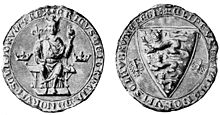Erik VI. (Denmark)
Eric VI. Menved (Danish Erik VI. Menved ; * 1274 ; † November 13, 1319 ) was a son of Eric V and from 1286 to 1319 King of Denmark .
Life
His parents were King Erik V. Klipping and Agnes von Brandenburg . He succeeded his father, murdered in 1286, as a minor on the throne. For a short time, Waldemar IV. Of Schleswig was imperial administrator of the young king, to whom the duke owed his freedom. His mother ruled for him until 1294. The nickname "Menved" should come from his preferred oath formula "ved alle hellige mænd" - "by all holy men".
In 1296 Erik married Ingeborg Magnusdotter , the daughter of King Magnus Ladulås of Sweden. Erik VI. saw itself in the tradition of King Waldemar II and legitimized his expansionist policy in the southern Baltic region through a document from the chancellery of Emperor Frederick II , confirmed by King Albrecht I , which granted the Danish kings that rule north of the Elbe and Elde, but Denmark overthrew it into a financial fiasco. His rule was marked by strong domestic Danish opposition and aristocratic revolts, which manifested themselves in the person of Jens Grand , Archbishop of Lund . Also the Swedish politics, the arguments between King Birger Magnusson , the brother of the wife Erik VI. and his sister Märta married, and his brothers Erik and Waldemar, brought him into military conflicts.
Relations with the Hanseatic cities in the southern Baltic region
Erik pursued a Danish hegemonic policy in the Pomeranian area. So he tried to oppose the emerging Hanseatic cities with territorial state violence, curtail their privileges and at the same time prevent Swedish-Norwegian mercenary recruitment there.
Relationship with Lübeck
He temporarily acquired the patronage of Lübeck (1307-1319), since the patriciate there expected a conflict with the Holsten princes . The Danish king was a strong ally in the late Middle Ages when the royal rule was weak, so that he was offered the post of patron saint in Lübeck. Lübeck only signed the support alliance of the Hanseatic cities of 1308 on the condition that it would not get into any dispute with Erik.
Episode before Rostock
Erik, who had been the de facto lord of Rostock since 1300 , wanted to hold a big festival there in 1311. It was supposed to be a presentation of courtly and feudal self-image. Significant figures from the poetic elite of the time, such as Heinrich Frauenlob von Meißen, were present to record the events in June. However, the city did not open its gates to the huge contingent because it suspected that Erik of Denmark wanted to further expand his position as patron of Rostock. That knightly festival now had to be celebrated in front of its gates. Badly offended by this event, Erik declared war on the town. A Rostock embassy under the leadership of councilor Bernhard Kopman did not manage to resolve the dispute. A first federation of the Hanseatic cities was now in conflict with a coalition of imperial counts, which included the margraves of Brandenburg and the general Heinrich II of Mecklenburg , who had been appointed by Erik as governor of Rostock. This episode brought the once immediate principality of Rostock as a fiefdom under the power of the expanding Mecklenburg.
Stralsund and the conflict with the Margrave of Brandenburg
Since Stralsund was connected with the Rügen princes , who in turn were in feudal dependence on Denmark, revolts there led to further military actions by Erik in the Old Kingdom. As a result, he got into a conflict ( margravial war ) with the Brandenburg margrave Woldemar , who was always anxious to open up a path to the sea for the margraviate. With the help of the Mecklenburg Count Heinrich the Lion, who was appointed by him as marshal, and other rulers, Erik VI tried. to carry out his policy. This war of 1316/17 culminated in the Battle of Gransee and ultimately brought little change to the status quo . The chronicler Ernst von Kirchberg , commissioned by Duke Albrecht III. from Mecklenburg, describes these processes in a rhyming chronicle.
Erik thus turned out to be one of the last rulers to present Denmark as a great power.
See also
literature
- Ingvor Margaretha Andersson: King Erich Menved and Lübeck. In: Journal of the Association for Lübeck History and Archeology . 39, 1959, pp. 69-116.
- Erich Hoffmann: King Erik Menved and Mecklenburg. In: Tillmann Schmidt, and Helge Wieden (Ed.): Mecklenburg and his neighbors. Rostock 1997, pp. 43-68. (Publications of the Historical Commission for Mecklenburg: Series B, Writings on Mecklenburg History, Culture and Regional Studies)
- Werner Knoch: Wismar, Rostock and Heinrich II. Von Mecklenburg 1310/4 according to Ernst von Kirchberg's rhyming chronicle (1378). In: Hansische Geschichtsblätter 110, 1992, pp. 43–56.
| predecessor | Office | successor |
|---|---|---|
| Erik V. |
King of Denmark 1286-1319 |
Christopher II. |
| personal data | |
|---|---|
| SURNAME | Erik VI. |
| ALTERNATIVE NAMES | Erik VI. Menved |
| BRIEF DESCRIPTION | Danish king (1286-1319) |
| DATE OF BIRTH | 1274 |
| DATE OF DEATH | November 13, 1319 |
